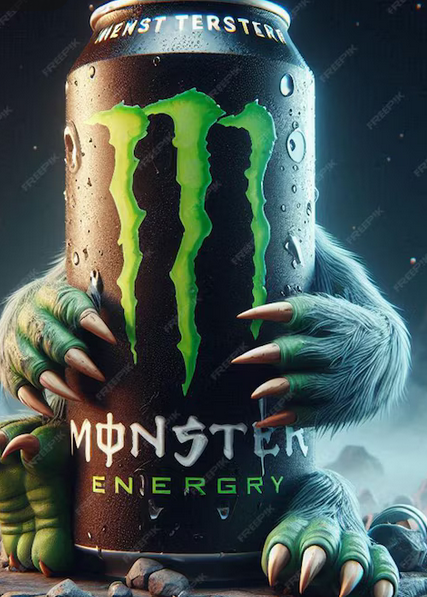Energy drinks have exploded in popularity over the past two decades, offering a quick boost of energy for students, professionals, athletes, and night owls alike. With its iconic claw-mark logo and variety of bold flavors, Monster has become a global phenomenon. But what’s actually inside a can? How does it impact your health? This article takes an in-depth look at Monster Energy Drink Nutrition Facts, breaking down its ingredients, health effects, and how it fits into a balanced diet.
A Quick Overview of Monster Energy
Monster Energy was first introduced by Hansen Natural Company (now Monster Beverage Corporation) in 2002. Since then, it has launched dozens of flavors and variations including Monster Zero Ultra, Monster Lo-Carb, Monster Rehab, and even coffee and tea hybrids.
It’s marketed as a product that can enhance mental alertness, improve focus, and boost energy levels, but there are important nutritional details to understand before reaching for a can.
Monster Energy Drink (Original) Nutrition Facts
Here’s the standard breakdown for one 16-ounce (473 mL) can of Original Monster Energy drinks:
-
Calories: 210 kcal
-
Total Fat: 0 g
-
Cholesterol: 0 mg
-
Sodium: 370 mg
-
Total Carbohydrate: 54 g
-
Sugars: 54 g
-
-
Protein: 0 g
-
Caffeine: 160 mg
-
B Vitamins:
-
Niacin (Vitamin B3): 200% Daily Value (DV)
-
Vitamin B6: 200% DV
-
Vitamin B12: 200% DV
-
Riboflavin (Vitamin B2): 200% DV
-
It’s important to note that Monster packs high sugar content and a significant caffeine load, alongside an impressive dose of B vitamins.
Key Ingredients Breakdown
Monster’s unique effect comes from a proprietary blend of active ingredients designed to increase energy, alertness, and stamina.
1. Caffeine
At 160 mg per can, Monster delivers about the same amount of caffeine as 1.5 cups of coffee.
Caffeine effects include:
-
Improved mental alertness
-
Increased physical endurance
-
Temporary boost in metabolism
However, excessive caffeine can lead to:
-
Jitters
-
Anxiety
-
Increased heart rate
-
Sleep disturbances
2. Sugar
Monster contains a staggering 54 grams of sugar per can. That is almost 13.5 teaspoons of sugar, which is much more than the 25 grams for women and 36 grams for men that the American Heart Association recommends as a daily intake.
High sugar consumption is linked to:
-
Weight gain
-
Insulin resistance
-
Type 2 diabetes
-
Heart disease
3. B Vitamins
B vitamins play a role in:
-
Energy metabolism
-
Red blood cell production
-
Brain function
Monster offers very high doses (200% DV) of niacin, riboflavin, B6, and B12 — but since these are water-soluble vitamins, your body simply excretes what it doesn’t use. Over time, though, very high doses of B6 can cause nerve issues.
4. Taurine
Each can contains about 1000 mg of taurine, an amino acid important for:
-
Cardiovascular function
-
Development and function of skeletal muscle
-
Nervous system regulation
Although taurine sounds exotic, it’s naturally produced by the human body and considered safe at common energy drink levels.
5. Glucuronolactone
This naturally occurring chemical is believed to fight fatigue and improve physical performance, although research is limited.
6. Panax Ginseng Extract
Ginseng is thought to:
-
Enhance cognitive function
-
Boost physical stamina
-
Support the immune system
Its actual impact in Monster is debatable due to small quantities used.
Monster Variations: How They Differ Nutritionally
Monster Energy has diversified its lineup to appeal to a wider audience, and the nutrition profiles vary:
| Monster Variety | Calories | Sugar | Caffeine | Notable Differences |
|---|---|---|---|---|
| Original | 210 | 54g | 160mg | High sugar, classic energy formula |
| Lo-Carb Monster | 30 | 3g | 160mg | Low sugar, low calories |
| Monster Zero Ultra | 10 | 0g | 150mg | Sugar-free, lighter flavor |
| Monster Rehab | 25–40 | 3–6g | 150mg | Includes tea extracts, electrolytes |
| Java Monster | 200–220 | 30–40g | 160mg | Coffee + energy drink hybrid |
Consumers trying to reduce sugar intake often prefer Monster Zero Ultra or Lo-Carb Monster.
Health Effects: The Good, the Bad, and the Ugly
Potential Benefits
-
Increased Energy and Alertness: Thanks to caffeine and sugar.
-
Enhanced Physical Performance: Some studies show caffeine can improve endurance sports performance.
-
Mood Boost: Sugar and caffeine can temporarily lift mood and reduce fatigue.
Potential Risks
-
Sugar Overload: One can delivers about 1.5x the recommended maximum daily sugar intake.
-
Caffeine Side Effects: Insomnia, jitters, elevated heart rate, and even anxiety.
-
Heart Health Concerns: Energy drinks have been associated with elevated blood pressure and heart palpitations, especially when combined with alcohol.
-
Kidney Impact: Excessive taurine and caffeine intake may strain the kidneys over time.
-
Dehydration: Caffeine is a diuretic and can lead to dehydration if not balanced with water intake.
Who Should Be Especially Cautious?
-
Children and Adolescents: Pediatricians advise against energy drinks for anyone under 18.
-
Pregnant and Nursing Women: High caffeine intake can pose risks to the fetus or infant.
-
People with Heart Conditions: Monster can exacerbate heart problems or increase blood pressure.
-
Those Sensitive to Caffeine: Even one can may cause significant side effects.
Tips for Consuming Monster Energy More Safely
If you choose to drink Monster, here are ways to mitigate risks:
-
Limit Intake: Stick to one can per day or less.
-
Watch Total Caffeine: Consider caffeine from all sources (coffee, tea, soda) to avoid exceeding 400 mg/day.
-
Hydrate: Drink plenty of water to counteract dehydration risks.
-
Avoid Mixing with Alcohol: The stimulant effect of Monster can mask the sedative effects of alcohol, increasing risk of binge drinking and accidents.
-
Eat First: Consuming Monster on an empty stomach can intensify side effects like jitters and heart palpitations.
Monster Energy vs Coffee: Which Is Better?
Many people debate whether a can of Monster or a cup of coffee is the better choice for a pick-me-up.
| Beverage | Caffeine | Calories (typical) | Sugar Content | Other Nutrients |
|---|---|---|---|---|
| Monster Energy | 160mg | 210 kcal | 54g | B Vitamins, Taurine |
| Black Coffee (8 oz) | 95mg | 2 kcal | 0g | Small amounts of B Vitamins |
Verdict:
If you want an energy boost with fewer calories and zero sugar, black coffee is a healthier option. Monster delivers a more intense experience but comes with a heavy sugar load and higher calorie count.
Monster Energy and Exercise: Boost or Bust?
Some athletes turn to Monster for an energy boost before workouts. But is it a good idea?
-
Pre-Workout Use: Monster’s caffeine can enhance endurance temporarily.
-
Post-Workout Caution: The high sugar content isn’t ideal for recovery; it can lead to blood sugar spikes and crashes.
-
Better Alternatives: Pre-workout supplements, coffee, or even water with electrolytes are typically healthier options for fueling workouts.
Myths and Misconceptions
1. Monster Energy Contains Alcohol
False — Monster does not contain alcohol.
2. Monster is Just Like Soda
Partly True — While Monster has similarities to soda in sugar content, it also has much higher caffeine and additional stimulants like taurine and ginseng.
3. Monster Energy is Safe for Kids
False — Health authorities recommend children and teens avoid energy drinks altogether.
Final Thoughts
Monster Energy Drink Nutrition Facts delivers a powerful punch of caffeine, sugar, and energy-enhancing ingredients. It’s a quick way to wake up, boost alertness, or power through long tasks, but it comes with significant health trade-offs, especially if consumed regularly.
Moderation is key. An occasional Monster is unlikely to cause harm for healthy adults, but making it a daily habit could increase your risk for heart disease, weight gain, and other issues. If you choose to indulge, do so with an understanding of what’s inside the can — and always listen to your body’s response.
For long-term energy, healthier alternatives like coffee, tea, balanced meals, hydration, and good sleep hygiene remain the gold standard.
FAQs:
1. How much caffeine is in a Monster Energy Drink?
One 16-ounce can of Original Monster Energy contains about 160 mg of caffeine, similar to 1.5 cups of coffee.
2. Is Monster Energy Drink bad for your health?
In moderation, it’s generally safe for healthy adults, but high sugar and caffeine levels can pose health risks if overconsumed.
3. How many calories and sugar does a Monster Energy have?
A 16-ounce can has around 210 calories and a high 54 grams of sugar, which exceeds the recommended daily sugar intake.
4. Can kids or teens drink Monster Energy?
Health experts recommend that children and teenagers avoid energy drinks due to high caffeine and sugar content.
5. Are there healthier alternatives to Monster Energy?
Yes, options like black coffee, green tea, or electrolyte drinks offer energy boosts with fewer calories and less sugar.





